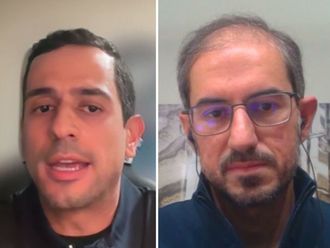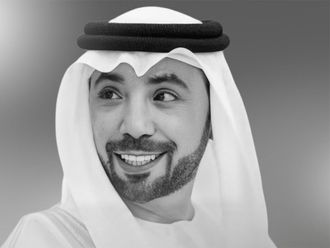Jassim Al Khoraffi, Speaker of the National Assembly (Parliament), said the post-war period in Iraq would be more difficult than the war itself and warned that any internal strife would undermine the war achievements and disintegrate the Arab country.
In an interview with Gulf News at his parliament office in Kuwait City, Khoraffi also dismissed Arab calls for halting the war as unrealistic and said Saddam missed a good chance of saving his people when he ignored a peace initiative by UAE President His Highness Sheikh Zayed bin Sultan Al Nahyan.
"I am not telling you a secret that we were among the strongest supporters of Saddam Hussain and now we admit that we were completely wrong," he said, referring to billions of dollars extended to Iraq by Kuwait and other Gulf states to finance its 1980-1988 war against Iran.
"That is why we hope that what Saddam did to us will not be repeated by the new regime... There is no doubt that this time we will not rush to any regime as we did to Saddam's regime before we make sure that the new regime is serious and keen about our mutual interests and good neighbourliness... It is our duty to get assurances so the new relationship will not be an emotional one... We have learned a lesson and I believe that we have to be logical and reasonable this time."
Khoraffi, whose country was invaded by Iraq in August 1990, said Kuwait would talk to the new Iraqi regime about its prisoners of war, whom it believes were captured by Iraqi invasion forces in 1990 and are still held inside Iraq.
He said the POWs issue would top the agenda of any future contacts with Saddam's successors and tackling such a problem would be a test for the new regime. "I wish sincerely that the new Iraqi regime would reassure the Kuwaiti people about this issue and that it would fully comply with all relevant UN resolutions so it will dispel the fears that have been created by the Saddam regime," he said.
"That is why I can say that I am optimistic... I do hope that we will work together to remove all traces left by that regime, which has destroyed Iraq, fragmented the Arab nation and distracted us from the central cause, which is the Palestinian cause."
Khoraffi said he felt the dispute between Kuwait and Iraq was nearly over and any new regime would not think of invading the emirate in the future.
He noted that the border problem had been resolved by the United Nations, adding Kuwait is the only country in the world whose borders are demarcated by the UN.
"We do not have any problem in this regard and I don't think anyone is able to change this historic and legal situation," he said.
"I believe that after what happened to Saddam Hussein, anyone who dares speak about such problems will remember Saddam's fate... I am sure that with the introduction of democracy in Iraq and the end of this nightmarish regime, such adventures will not happen again... I reckon that any Iraqi will think thousands of times before he demands the annexation of Kuwait again."
But Khoraffi said Kuwait wanted normal ties with post-Saddam Iraq and expected the government to reopen its embassy in Baghdad on the grounds "the events are happening quickly and Kuwait does not want to be away from such events".
He stressed that Kuwait intends to play a strong role in Iraq after the end of the war, whether in reconstruction or offering assistance to the Iraqi people. He said Iraqis faced a bigger challenge after the war and warned against an internal conflict.
"I am afraid that the burdens after the war will be much more than during or before the war... As you know, in a couple of weeks, the new regime will be finished but what worries me is the situation after the war... We, as Arabs, should start preparing now for that stage so we will not be mere bystanders or onlookers," he said.
"We should get moving and stay away from slogans and theories... What I mean by theories is that we should stop calling for halting the war because it is now in its end and will only end when the current regime ends... Such calls are illogical and unrealistic... What concerns us now is to prepare for the post-war period," he said.
"We should not forget that the Iraqi people have suffered from a dictatorial and terrorist regime for 30 years and they can not switch to democracy overnight... They had one of the wealthiest countries and it is now among the poorest... That is why they need time to adapt to the new situation and at the same time need our help."
Khoraffi said such assistance would greatly support the Iraqi people but warned it would be futile if they do not unite in rebuilding their country.
"I pray to God that the Iraqi people will unite, rally around their new government and forget any past differences to safeguard Iraq's unity... They should rise to the occasion to prove to the world that they deserve this democracy and freedom," he said.
"The most dangerous thing that could happen after the end of this nightmarish regime is that these moments of delight and happiness could turn into sadness and sorrow as a result of any rifts or conflicts between the different parties."
Khoraffi considered the end of Saddam and his Baathist regime as a new era for Kuwait but said he was saddened by the large number of casualties among Iraqi civilians. He blamed Saddam for the tragedy and said he could have saved Iraq and his people if he had heeded Sheikh Zayed's proposals.
"Of course, we and nobody else wanted this war... We have called many times for the implementation of Sheikh Zayed's initiative but unfortunately it was not heeded by anyone... (Saddam) is to blame for what has happened... He could have simply adhered to the UN resolutions and offered this sacrifice for his people," he said.
"To be honest, I am not surprised at what happened because of his intransigence... But I am really upset and saddened for the Iraqi people... I do hope that this nightmarish and violent regime will come to an end so Iraq will enjoy its wealth, get democracy and live the life which its people deserve... In a nutshell, the problem was with the regime, which could have spared Iraq and the region all this bloodshed had he listened to Sheikh Zayed."
Asked about his vision of the region after the end of the Iraq war, Khoraffi said he expected prosperity, but added this required Arab cohesion.
"The future of the region depends greatly on what we, as GCC, Arabs and Moslems, would do... If we sit together, talk frankly and tackle all our problems, then I can say I am optimistic about the future," he said.
"But if we insist on being unrealistic and on using hollow slogans, which mean nothing and are of no use to our peoples, then we are back to square one and to the old formula – that the Arabs agree not to agree."









